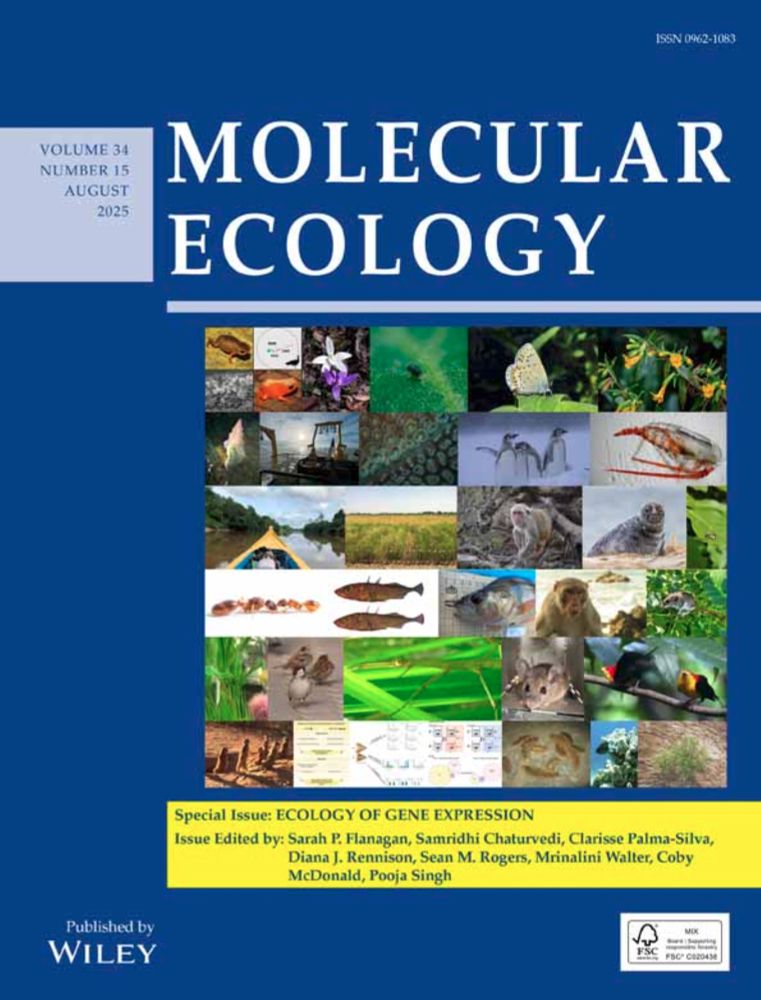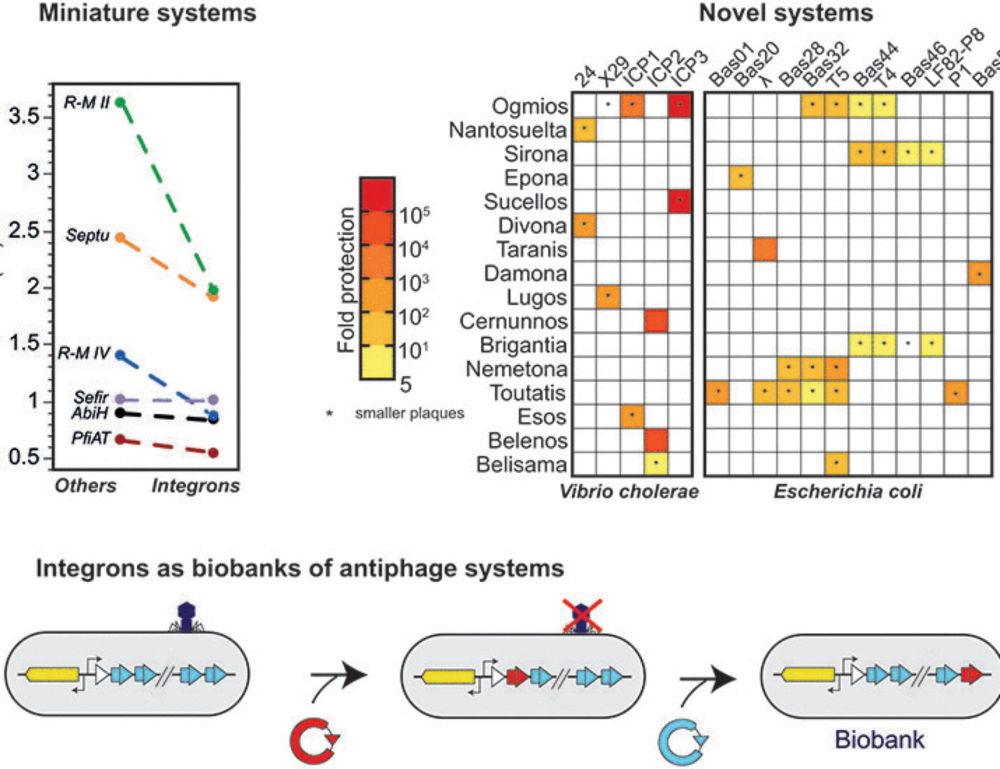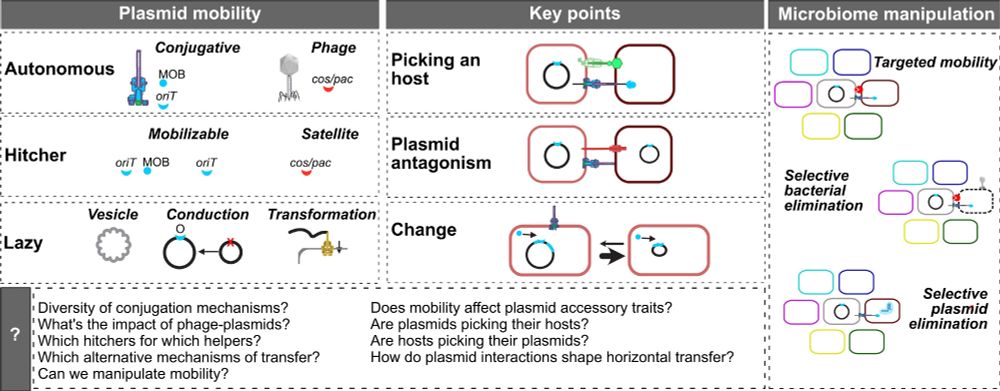
MICALIS, Jouy-en-Josas, INRAE (France)
Passionated about gut phages, especially the temperate and episomal ones (phage-plasmids).
@jorg-vogel-lab.bsky.social @helmholtz-hiri.bsky.social
@uni-wuerzburg.de @helmholtzhzi.bsky.social
published now in @nature.com

@jorg-vogel-lab.bsky.social @helmholtz-hiri.bsky.social
@uni-wuerzburg.de @helmholtzhzi.bsky.social
published now in @nature.com
𝐏𝐡𝐚𝐠𝐞-𝐩𝐥𝐚𝐬𝐦𝐢𝐝𝐬 (𝐏-𝐏𝐬) are fascinating elements: both 𝐭𝐞𝐦𝐩𝐞𝐫𝐚𝐭𝐞 𝐩𝐡𝐚𝐠𝐞𝐬 and 𝐩𝐥𝐚𝐬𝐦𝐢𝐝𝐬 ➡️ tricky to detect.
We present 𝐭𝐲𝐏𝐏𝐢𝐧𝐠 — the first 𝐢𝐝𝐞𝐧𝐭𝐢𝐟𝐢𝐜𝐚𝐭𝐢𝐨𝐧 𝐚𝐧𝐝 𝐜𝐥𝐚𝐬𝐬𝐢𝐟𝐢𝐜𝐚𝐭𝐢𝐨𝐧 𝐭𝐨𝐨𝐥 🛠️designed specifically for P-Ps:
✅ Accurate
✅ Sensitive
✅ Easy to use
📖 www.biorxiv.org/content/10.1...

Results and user guide on bioRxiv, GitHub+Zenodo
Check out: bsky.app/profile/kari...
Super proud (!) of the work by @karinailchenko.bsky.social & happy + many thanks to awesome collaboration with @epcrocha.bsky.social and R Bonnin.
𝐏𝐡𝐚𝐠𝐞-𝐩𝐥𝐚𝐬𝐦𝐢𝐝𝐬 (𝐏-𝐏𝐬) are fascinating elements: both 𝐭𝐞𝐦𝐩𝐞𝐫𝐚𝐭𝐞 𝐩𝐡𝐚𝐠𝐞𝐬 and 𝐩𝐥𝐚𝐬𝐦𝐢𝐝𝐬 ➡️ tricky to detect.
We present 𝐭𝐲𝐏𝐏𝐢𝐧𝐠 — the first 𝐢𝐝𝐞𝐧𝐭𝐢𝐟𝐢𝐜𝐚𝐭𝐢𝐨𝐧 𝐚𝐧𝐝 𝐜𝐥𝐚𝐬𝐬𝐢𝐟𝐢𝐜𝐚𝐭𝐢𝐨𝐧 𝐭𝐨𝐨𝐥 🛠️designed specifically for P-Ps:
✅ Accurate
✅ Sensitive
✅ Easy to use
📖 www.biorxiv.org/content/10.1...

Results and user guide on bioRxiv, GitHub+Zenodo
Check out: bsky.app/profile/kari...
Super proud (!) of the work by @karinailchenko.bsky.social & happy + many thanks to awesome collaboration with @epcrocha.bsky.social and R Bonnin.
𝐏𝐡𝐚𝐠𝐞-𝐩𝐥𝐚𝐬𝐦𝐢𝐝𝐬 (𝐏-𝐏𝐬) are fascinating elements: both 𝐭𝐞𝐦𝐩𝐞𝐫𝐚𝐭𝐞 𝐩𝐡𝐚𝐠𝐞𝐬 and 𝐩𝐥𝐚𝐬𝐦𝐢𝐝𝐬 ➡️ tricky to detect.
We present 𝐭𝐲𝐏𝐏𝐢𝐧𝐠 — the first 𝐢𝐝𝐞𝐧𝐭𝐢𝐟𝐢𝐜𝐚𝐭𝐢𝐨𝐧 𝐚𝐧𝐝 𝐜𝐥𝐚𝐬𝐬𝐢𝐟𝐢𝐜𝐚𝐭𝐢𝐨𝐧 𝐭𝐨𝐨𝐥 🛠️designed specifically for P-Ps:
✅ Accurate
✅ Sensitive
✅ Easy to use
📖 www.biorxiv.org/content/10.1...

𝐏𝐡𝐚𝐠𝐞-𝐩𝐥𝐚𝐬𝐦𝐢𝐝𝐬 (𝐏-𝐏𝐬) are fascinating elements: both 𝐭𝐞𝐦𝐩𝐞𝐫𝐚𝐭𝐞 𝐩𝐡𝐚𝐠𝐞𝐬 and 𝐩𝐥𝐚𝐬𝐦𝐢𝐝𝐬 ➡️ tricky to detect.
We present 𝐭𝐲𝐏𝐏𝐢𝐧𝐠 — the first 𝐢𝐝𝐞𝐧𝐭𝐢𝐟𝐢𝐜𝐚𝐭𝐢𝐨𝐧 𝐚𝐧𝐝 𝐜𝐥𝐚𝐬𝐬𝐢𝐟𝐢𝐜𝐚𝐭𝐢𝐨𝐧 𝐭𝐨𝐨𝐥 🛠️designed specifically for P-Ps:
✅ Accurate
✅ Sensitive
✅ Easy to use
📖 www.biorxiv.org/content/10.1...
What shapes #phage–bacteria #networks in #plant environments?
- Ecological origins of bacteria and phages?
- Phage taxonomy?
- Bacterial phylogeny?
- #Prophages? #Defence-systems?
📖 here: www.biorxiv.org/content/10.1...
Discover which of these actually shape the network 👇

What shapes #phage–bacteria #networks in #plant environments?
- Ecological origins of bacteria and phages?
- Phage taxonomy?
- Bacterial phylogeny?
- #Prophages? #Defence-systems?
📖 here: www.biorxiv.org/content/10.1...
Discover which of these actually shape the network 👇
These are our key findings:

These are our key findings:
Many thanks to everyone involved, especially my supervisor @epcrocha.bsky.social
bsky.app/profile/bapt...
In collaboration with the Rocha lab, we show in our new paper that cassettes of these large platforms encode many known anti-phage defenses, and uncovered 16 new ones.
www.science.org/doi/10.1126/...

Many thanks to everyone involved, especially my supervisor @epcrocha.bsky.social
bsky.app/profile/bapt...
Big thanks to @epcrocha.bsky.social, Erick D, Camille d'H, @fplazaonate.bsky.social, Quentin LB, and all others involved for support and contributions! 🙌
Out in Cell Reports @cp-cellreports.bsky.social
doi.org/10.1016/j.ce...
Here's what we found 🤓
Big thanks to @epcrocha.bsky.social, Erick D, Camille d'H, @fplazaonate.bsky.social, Quentin LB, and all others involved for support and contributions! 🙌
Out in Cell Reports @cp-cellreports.bsky.social
doi.org/10.1016/j.ce...
Here's what we found 🤓

Always inspiring to work with @epcrocha.bsky.social , Erick D, Camille d'H and everyone else within this super dynamic consortium
@inrae-france.bsky.social[email protected][email protected]! Many thanks for this great journey!🙌

Always inspiring to work with @epcrocha.bsky.social , Erick D, Camille d'H and everyone else within this super dynamic consortium
@inrae-france.bsky.social[email protected][email protected]! Many thanks for this great journey!🙌
biorxiv.org/cgi/content/...


